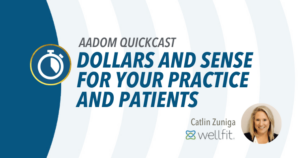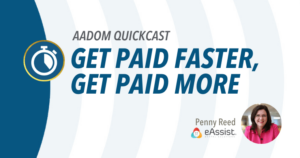AADOM LIVEcast: Free Money! Seriously…it’s FREE Money
Approved for 1 CE towards AADOM Designations when viewed in AADOM’s Learning Management System.
AADOM Members log in HERE to watch the recording and accrue CE.
Video Description:
Many practices were told they didn’t qualify for Employee Retention Credits (ERC) and many other practices did receive some ERC money, but not as much as they should have. Also, practices that started after Feb 15, 2020 may be classified as a “Recovery Start Up Business” and qualify for the ERC.
Course Learning Objectives:
- Why what your CPA told you about ERC may not be true
- Why even if your practice received PPP it still qualifies for ERC
- If you can be classified as a Recovery Start Up Business
- How much you should receive…or should have if you already did…receive ERC funds
- Who is an ethical ERC company and who is endorsed by state associations after Feb 15, 2020 may be classified as a “Recovery Start Up Business” and qualify for the ERC
Your Dental Practice Needs to Know: What is Considered a “Partial Suspension?”
When it comes to determining an organization’s eligibility for the Employee Retention Credit (ERC), the IRS has several criteria to consider. One broad qualification is a full or partial suspension of a business’s trade or operations due to government orders in 2020, during the height of the COVID-19 pandemic.
According to Section 2301(c)(2)(A) of the CARES Act, eligible employers would include: “Any employer carrying on a trade or business during calendar year 2020, and, with respect to any calendar quarter, for which (1) the operation of the trade or business carried on during calendar year 2020 is fully or partially suspended due to orders from an appropriate governmental authority limiting commerce, travel, or group meetings (for commercial, social, religious, or other purposes) due to COVID-19, or (2) such calendar quarter is within the period in which the employer had a significant decline in gross receipts, as described in section 2301(c)(2)(B) of the CARES Act.”
A full suspension of business operations is fairly easy to understand and evaluate. Business as usual was halted – period. But what about a “partial suspension?” What sorts of operational changes would be considered a partial suspension of business and would qualify an employer for the ERC?
Such changes would include:
- A reduction in physical capacity for customers or employees
- A reduction in services offered
- The inability to access equipment
- Travel restrictions that impeded business operations
An Example of Partial Suspension
Let’s say you have a business that manufactures auto parts, and your local jurisdiction considered you an essential trade or business, so you were able to remain open and operational.
However, one of your suppliers was required to suspend operations by a government order, and this suspension impacted their ability to deliver necessary raw materials to you. If you couldn’t get these raw materials from another supplier, you would be unable to continue your normal operations.
So although your business was able to remain open, you could be eligible for the ERC because your operations were hindered by a government order that impacted your supplier.
How Do I Find Out if I’m Eligible?
It’s very important to determine if you’re eligible for the ERC. It could result in a credit of up to $26,000 per employee on your payroll. But this highly specialized area of tax law requires expertise.
That’s where we come in. We’ve helped clients across the country figure it out.
We break a complex process down into a few simple steps. We’ll start with a free analysis to see if your business is eligible. Then, if you qualify, we can walk you through the payroll information and forms we’ll need to calculate your credit. Then we’ll help you submit the paperwork.
It’s that simple.
And with over $6 billion recovered for more than 100,000 qualified employers, it’s worth it.
How Do We Get Paid?
If our analysis determines that you aren’t eligible to receive the ERC, the review costs you nothing. It does, however, ensure that you don’t leave money on the table.
If we determine that you are eligible, our service charge is calculated along with your free analysis so you can see what you would receive as a credit and the percentage of the credit recovery that we would be paid. We’re only paid when you receive your credit. And our service fee is typically 10-15% of the credit amount.
There’s no risk, and a great potential reward.
Let’s get started today. We’re looking forward to helping you.
https://ercspecialists.com/?fpr=AADOM
Sponsored by: Merchant Advocate
Learn about the presenter:
Office Managers are rock stars and every rock star needs folks around to help them rise even higher.
A 24-year veteran of the merchant services industry, Cheryl McKenna helps dental Office Managers save money on, and increase the efficiency of, their payment systems. She is always on the lookout for ways to increase a practice’ bottom line and is honored to have worked with hundreds of AADOM practices over the last 10 years.






